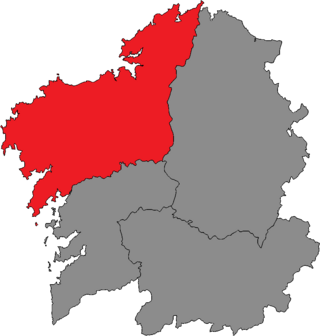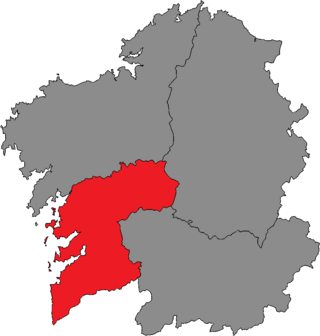
Galicia is an autonomous community of Spain and historic nationality under Spanish law. Located in the northwest Iberian Peninsula, it includes the provinces of A Coruña, Lugo, Ourense, and Pontevedra.
The Xunta de Galicia is the collective decision-making body of the government of the autonomous community of Galicia, composed of the President, the Vice-president(s) and the specialized ministers (Conselleiros).

The University of Vigo is a public university located in the city of Vigo in the Province of Pontevedra, Galicia, Spain. There are three campuses:
The Galician People's Union is a Galician nationalist and communist political party, and is one of the registered political parties of Spain. The party publishes the magazine Terra e Tempo, and the secretary general is Néstor Rego.
The Galician People's Front is a Galician political organization with a socialist and independentist ideology.

Alexandre Bóveda Iglesias, commonly known as Alexandre Bóveda, was a Spanish politician and financial officer from Galicia. He is considered one of the most important Galicianist intellectuals during the Spanish Second Republic. He was one of the founders and key member of the Partido Galeguista, origin of contemporary Galician nationalism.
The Partido Galeguista was a Galician nationalist party founded in December 1931. It achieved notoriety during the time of the Spanish Second Republic. The PG grouped a number of historical Galician intellectuals, and was fundamental in the elaboration of the Galician Statute of Autonomy.

The Galician Alternative of the Left was an electoral alliance of left-wing independentist and federalist political parties in Galicia, Spain.

The 1993 Galician regional election was held on Sunday, 17 October 1993, to elect the 4th Parliament of the autonomous community of Galicia. All 75 seats in the Parliament were up for election.

Galician Coalition is a political party in Galicia, Spain with a Galician nationalist and centrist ideology. Since 2012 CG is part of the coalition Compromiso por Galicia.

A Coruña is one of the four constituencies represented in the Parliament of Galicia, the regional legislature of the autonomous community of Galicia. The constituency currently elects 25 deputies. Its boundaries correspond to those of the Spanish province of A Coruña. The electoral system uses the D'Hondt method and a closed-list proportional representation, with a minimum threshold of five percent.

Lugo is one of the four constituencies represented in the Parliament of Galicia, the regional legislature of the autonomous community of Galicia. The constituency currently elects 14 deputies. Its boundaries correspond to those of the Spanish province of Lugo. The electoral system uses the D'Hondt method and a closed-list proportional representation, with a minimum threshold of five percent.

Ourense is one of the four constituencies represented in the Parliament of Galicia, the regional legislature of the autonomous community of Galicia. The constituency currently elects 14 deputies. Its boundaries correspond to those of the Spanish province of Ourense. The electoral system uses the D'Hondt method and a closed-list proportional representation, with a minimum threshold of five percent.

Pontevedra is one of the four constituencies represented in the Parliament of Galicia, the regional legislature of the autonomous community of Galicia. The constituency currently elects 22 deputies. Its boundaries correspond to those of the Spanish province of Pontevedra. The electoral system uses the D'Hondt method and a closed-list proportional representation, with a minimum threshold of five percent.

This is the results breakdown of the European Parliament election held in Spain on 7 June 2009. The following tables show detailed results in each of the country's 17 autonomous communities and in the autonomous cities of Ceuta and Melilla.

This is the results breakdown of the European Parliament election held in Spain on 10 June 1987. The following tables show detailed results in each of the country's 17 autonomous communities and in the autonomous cities of Ceuta and Melilla.

This is the results breakdown of the European Parliament election held in Spain on 15 June 1989. The following tables show detailed results in each of the country's 17 autonomous communities and in the autonomous cities of Ceuta and Melilla.

This is the results breakdown of the European Parliament election held in Spain on 13 June 1999. The following tables show detailed results in each of the country's 17 autonomous communities and in the autonomous cities of Ceuta and Melilla.

This is the results breakdown of the European Parliament election held in Spain on 13 June 2004. The following tables show detailed results in each of the country's 17 autonomous communities and in the autonomous cities of Ceuta and Melilla.

The next Galician regional election will be held no later than Saturday, 25 March 2028, to elect the 13th Parliament of the Autonomous Community of Galicia. All 75 seats in the Parliament will be up for election.


















